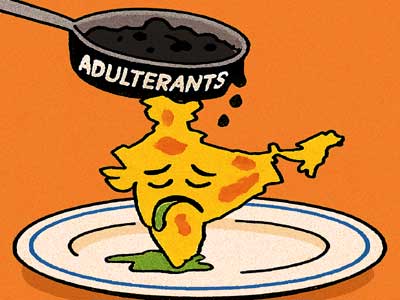In a country dreaming of becoming a global superpower, a quiet and deadly betrayal unfolds every single day, right on our plates, in our medicine cabinets, and even within the degrees we proudly display. From adulterated milk to fake medicines, from poisonous liquor to bogus diplomas, India is battling an invisible epidemic: the rot of adulteration.
“This isn’t just fraud—it’s a full-blown public health and moral crisis. And the victims? Ordinary citizens who trust what they eat, drink, and consume without questioning its authenticity”, says social activist Mukta Gupta.
Start with the food we eat. A 2019 report by the Food Safety and Standards Authority of India revealed that 28 per cent of the food samples tested were adulterated or substandard. Everyday essentials like milk, spices, and oils are commonly tainted. Milk is often watered down, or worse, laced with chemicals like urea or detergent. Turmeric and chilli powder, kitchen staples, are mixed with toxic dyes such as metanil yellow, a known carcinogen.
Street food, a beloved part of Indian culture, has become a risky indulgence. Shocking incidents reveal just how filthy and unsafe our food systems have become. Prof Paras Nath Choudhary doesn’t mince words, “We are still seen as a third-world country because there’s zero accountability in food safety. From pavement stalls to high-end restaurants, the hygiene is appalling. I've found a rat part in my dish; a friend found a tooth in his samosa. The so-called food inspection department has failed us for seventy years. They treat their jobs as joyrides, not as duties.”
Despite the presence of food safety regulations, the ground reality is dismal. The FSSAI is understaffed and underfunded. In 2023, only 1.2 lakh food inspections were carried out in the entire country, a laughable number for a population of 1.4 billion. Bribes and corruption are rampant. Inspectors often look the other way, or worse, tamper with samples.
If contaminated food doesn’t get you, spurious liquor might. The numbers are chilling. In 2024 alone, over 200 deaths were reported in states like Uttar Pradesh, Bihar, and Tamil Nadu due to the consumption of illicit alcohol. These deadly brews often contain methanol—a toxic chemical that can cause blindness or instant death.
The National Crime Records Bureau states that over 1,000 people die each year from fake liquor. Yet the industry flourishes under the protection of local mafias and corrupt officials. Laws are outdated, with penalties as low as ₹5,000 for crimes that kill. Court cases crawl at a snail’s pace, witnesses are silenced, and the guilty walk free.
Environmentalist Dr Devashish Bhattacharya says, "The adulteration of medicine is no less horrifying. According to a 2021 WHO report, about 10 per cent of medicines sold in India are either fake or substandard. The consequences are catastrophic. Cancer patients have unknowingly received counterfeit chemotherapy drugs. Antibiotics mixed with chalk and flour fail to treat infections."
The Central Drugs Standard Control Organisation, responsible for regulating drugs, is painfully slow and ineffective. With over 10 lakh pharmacies in the country, the agency conducts fewer than 50,000 inspections annually. Corruption thrives. Bribes ensure fake drug rackets flourish while inspectors turn a blind eye, according to a senior lawyer, Rajvir Singh. As Prof Choudhary grimly remarks, “Even poison, if bought on the black market in India, might not be pure.”
Retired senior teacher Mira says, "Not even education is immune. The market is flooded with fake degrees and forged certificates. A 2023 sting operation by The Indian Express uncovered a racket in Uttar Pradesh that sold fake degrees for as little as ₹10,000. Social media platforms openly advertise such services."
This leads to a dangerous trend. Unqualified individuals getting jobs in critical sectors like healthcare, engineering, and teaching, putting real lives at risk, adds Rajiv Gupta, President of Lok Swar.
At the heart of this national tragedy is a broken system. Laws are toothless, enforcement is corrupt, and the political will to fix it is nonexistent. The judiciary is too slow. Convictions, if they happen at all, take decades. Officials entrusted with safeguarding the public are either asleep at the wheel or actively complicit, says home maker Padmini Iyer.
Prof Choudhary calls the food inspection department a ‘gravy train’, and sadly, he's right. Governments, past and present, have treated this issue with indifference. The problem is not one of awareness, but of intent.
Fixing this rot requires more than routine reforms; it demands a ruthless, uncompromising overhaul. Consider capital punishment for repeated adulteration. Use technology like blockchain to track drug and food authenticity. Empower independent bodies to carry out inspections without political interference.
















Related Items
India’s ‘Unique’ Journey as a Republic…
India rises as a ‘Global Medical Travel Destination’
Two pictures from one morning in one country...